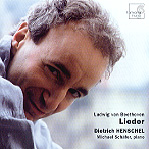Beethoven may have written more than 80 songs–but he wasn’t truly a song composer. Or was he? A quick glance at the catalog reveals a healthier-than-you-might-expect devotion to the song-cycle An die ferne Geliebte Op. 98–by everyone from Wunderlich and Prey to Fischer-Dieskau and Vickers, as well as numerous more recent offerings such as this one and the reference versions. And of course, the most famous Beethoven song of them all, Adelaide, is included in dozens of recitals by both male and female singers, along with the almost-equally-famous Zärtliche Liebe (“Ich liebe dich”), not to mention various other collections (Op. 48 and Op. 83) and folksong arrangements. So, it seems that Beethoven is popular with many of the world’s best song recitalists–but does the music warrant investigation by newcomers for whom lieder means Schubert and Schumann and Brahms?
The answer is definitely “yes”. And through this wonderful recital by baritone Dietrich Henschel and his artful, stylish, and totally sympathetic partner Michael Schäfer, we not only can become happily acquainted with Beethoven’s underrated but meticulously and caringly crafted songwriting, but also may find ourselves charmed and even moved by a particularly adept word-setting, a sparkling piano figuration, or a simply lovely melody. We can discover these things beginning with the aria-like An die Hoffnung Op. 94 or Lied aus der Ferne, or in the tender tunes of Zärtliche Liebe or Bitten (from Sechs Lieder Op. 48), or in the dark drama of Vom Tode (also from Op. 48) whose theme, developmental structure, and harmonic cast foreshadows works by later, more overtly Romantic composers.
And for sheer wild, outrageous fun, don’t miss the setting of Es war einmal ein König (the “Song of the flea” from Goethe’s Faust), which comes at the end of a group of three lively, fast songs that show an unusually lighthearted, playful, and thoroughly engaging spirit from a composer traditionally depicted as perpetually serious and brooding. The Goethe song is a tour de force for singer and pianist that ends–or more correctly, unravels–with pounding dissonances in the piano. The melody to Auf dem Hügel sitz’ ich, spähend–the first of the Op. 98 cycle–is one of Beethoven’s most sublime, and he thankfully brings it back at the end of the set’s final song.
Henschel is an exceptionally thoughtful and intelligent singer with a lovely, warm tone, keen sense of phrasing and inflection, and faultless technique. He has an extraordinary command of range and consistency of tone across registers–and he has formidable and gorgeous upper notes, showing off brilliant Fs, Gs, and even a high-A-flat without any strain at all. Schäfer is not only an able accompanist, but also gets a chance to demonstrate his solo playing with performances of the Op. 89 Polonaise, Op. 77 Fantaisie, and the Andante favori WoO 57. My only problem here is with the sound of the piano, whose upper registers seem overly bright, slightly metallic–there are times when you might think this instrument is a period fortepiano rather than a modern grand. Nevertheless, this recital is a welcome addition to the catalog, providing both an ideal introduction to a lesser-known region of Beethoven’s output and another successful outing for one of today’s truly outstanding singers.
































